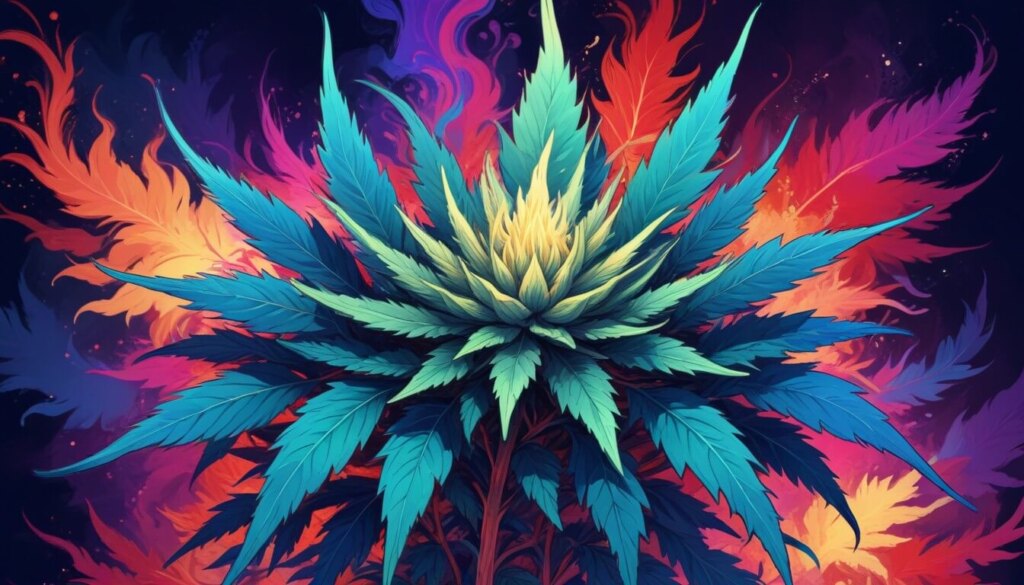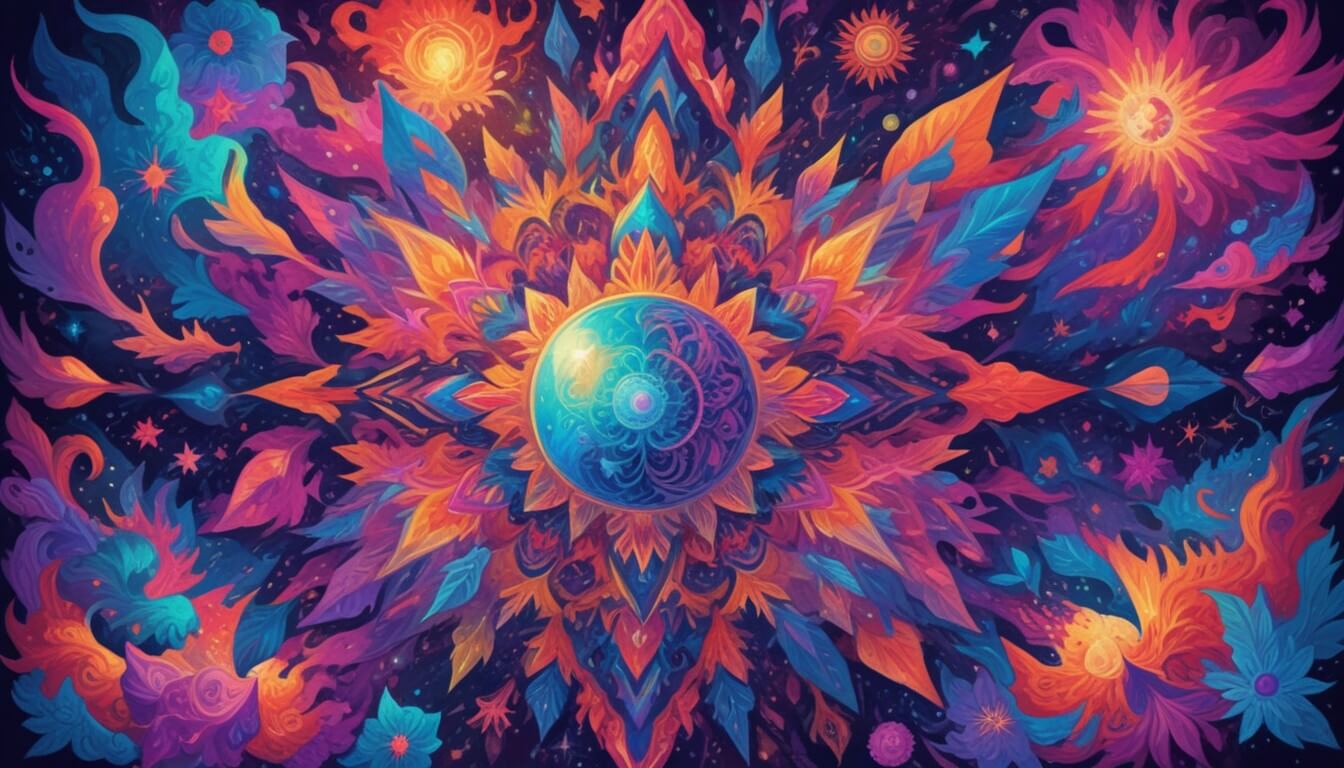The brain is a complex organ that works through several reactions and processes that take place in it constantly. Several neurotransmitters and chemicals work effectively to ensure the smooth working of the brain. Psychedelics are among some potent psychoactive substances that work to affect and regulate mood and different brain functions. What are psychedelics exactly? Let’s learn together!
What Are Psychedelics?
Psychedelics are powerful substances that mess with your brain in a big way. They change how you see things and how you feel, and they can mess with how you think too. But here’s something interesting: they are usually not physically harmful, and you are not likely to get addicted to them.
People have been using psychedelics for way longer than you can imagine. Early societies used them in all sorts of situations, like ceremonies or rituals. Scientists got curious about psychedelics, especially after they discovered a chemical called LSD and found out about serotonin in the brain. They thought maybe LSD and other psychedelics worked by messing with serotonin.
Today, most scientists agree that psychedelics interact with a specific part of the brain called the serotonin 5-hydroxytryptamine 2A receptors. These receptors are like switches in our brains, and when psychedelics mess with them, they can make us see and feel things differently.
The Psychedelic Experience: Types and Effects
Psychedelic drugs are often divided into various groups, and they each produce disparate effects and can possess different components. Let’s take a look at some of them.
LSD
LSD or Lysergic Acid Diethylamide is an acronym and the full form of it can be written as acid which is very commonly used slang in youth. It is a dense, loaf-like bread made by the cultivation of mold in the labs from mold of grains. Even though the use of it has been made illegal, it is popular among people.
Dimethyltryptamine (DMT)
The very first one is a little-known one, and it comes from certain trees in Central and South America. The effects of these kinds of drugs might be less strong as they usually last about an hour.
Mescaline
Mescaline is ESAI among the cacti, like the peyote cactus, which produces similar consequences to LSD.
Ololiuqui
This psychedelic is naturally present in the seeds of morning glory flowers in Central and South America Although not so well-known as mugwort, its smell is preferred in some religious ceremonies.
Psilocybin
This is so in certain mushroom varieties, which are popularly known as magic mushrooms. They survive in plenty of places, but the legality of the matter is horrible.
Ecstasy (MDMA)
Although ecstasy has its character as being different from other psychedelic substances, it indeed will make you see things and feel them differently. This is the one with the purpose of your delight, like how this makes you feel happy and gets energized.
But here are some common effects that these psychedelics can have on your senses:
- Time might feel weird like it is speeding up or slowing down
- It might be hard to talk clearly to other people
- You could see, hear, or feel things that are not there (hallucinations)
- You might feel like you understand things in a new way
- Your energy might go up
- It could be tough to think logically
- You might mix up your senses, like seeing sounds or hearing colors
- You might feel sick to your stomach
- Some people say they have spiritual experiences or intense senses
- Short-term effects can include a faster heart rate, higher body temperature, dizziness, and even panic or paranoia for some
Short-term effects can include a faster heart rate, higher body temperature, dizziness, and even panic or paranoia for some.
Therapeutic Potential: A New Frontier in Mental Health
An intriguing frontier has emerged in the world of psychedelics, and that is their potential in improving therapies. Otherwise generally considered to be a taboo, these substances are way more sophisticated and analysis is being carried out with profound intricacy to see them addressing mental health problems of varied ranges.
Among the array of psychedelic compounds, several have captured the attention of researchers and clinicians alike.
MDMA
MDMA, being very much known for its empathogenic ability, is being researched as a possible PTSD treatment medication. Rather than being the sole factor, its function of producing empathy, closeness with others, and emotional engagement started MDMA-aided psychotherapy as one of the breakthrough methods in trauma treatment.
Psilocybin
This compound is present in some types of mushrooms and is one of the main bioactive ingredients of psychedelics and is demonstrated to be an antidepressant, anti-anxiety, and anti-addictive.
Consequently, we do have a fact in which prudent psilocybin expeditions are carried along under the influence of controlled conditions, which enables them to induce remarkable and influential mystical experiences that offer a lasting psychological transformation.
Ketamine
The therapeutic use of ketamine also gets into the frame being its rapid antidepressant properties. Actually, because of this, a lot of people are now talking about ketamine as a possible way to alleviate depression which is not treatable with drugs available. Ketamine infusions give some light in the fog to those patients suffering from long-lasting mood disorders.

Navigating the Risks: Safety, Legality, and Ethical Considerations
While psychedelics can have therapeutic potential, their introduction to mainstream mental health care has significant challenges. Regulatory problems, stigma, and the lack of data collection hinder the advent of effective drugs to treat tuberculosis.
Nonetheless, with responsible and ongoing scientific investigation, we witness spiritual medicine leading to revolutions in the field of psycho and other psychiatric treatment. The potential adverse effects include.
Psychological Distress
Some psycho-delic experiences, however, can have concern-intensive emotional conditions, which could be a reason for developing anxiety, phobia, or psychosis if the person is vulnerable.
Physical Effects
Some psychedelics are capable of inducing psycho-physiological effects such as increased heart rate, elevated blood pressure, and nausea.
Long-Term Impacts
The field of psychedelic research still has limited data on the potential effects and consequences of long-term use, such as emotional and cognitive disorders.
Navigating Legal Boundaries
The law related to psychedelics remains as complex and different with each jurisdiction. However, this categorization does not imply that all controlled substances are criminalized.
Although there may be some substances that possess limited legal use as they can be used in certain settings, such as religious or research, they still belong to the list of controlled substances.
Ethical Considerations
A patient’s consent to therapy must be fully informed, that is, the patient not only learns the expected effects but also any risks and benefits of this treatment Moreover, the therapist through his or her own interventions has a responsibility to safeguard the patient’s welfare and reduce any negative influence that may be there throughout the therapeutic process.
Psychedelics in Culture and Society: From Stigma to Science
The timeline of psychedelics, in a culture and society at large, has always been very unique – from initial stigma and condemnation to a new paradigm where well-being using psychedelics is approached with scrutiny and possibly acceptance.
Psychedelics have been mostly in the shadows. In many cases, they were connected with counterculture, street drug usage, and the fear of society about them.
Propagation of fake news, exaggerated depictions portrayed by mass media, and influence of policies on the part of the government serve to excite misconceptions and create a climate of fear and disapproval.
Consequently, though psychedelics can be controversial, they are important elements of religious and spiritual customs in many human cultures and civilizations throughout history.
Lately, there has been a growing interest in psychedelic substances again, and the movement is being defined as a psychedelic renaissance, which includes opening up so that research might be based on science, rather than on stigma. Innovative studies have been pivotal in prying up the curtain to what promises to be pharmacotherapeutic approaches to various mental health issues, such as depression, PTSD, and addictions.
The Psychedelic Renaissance and What Lies Ahead
The term “psychedelic renaissance” is the embodiment of an exceptional time that has the unique characteristic of a mass influx of interest, investigation, and research about psychiatric therapeutics.
The resurgence of the psychedelic renaissance can be put down to the late 1960’s, when LSD and Psilocybin cultural appeal to scientists, psychiatrists, and other worshippers.
However, this was replaced with recreational use, moral panic, governmental crackdown, and so on that led to a period of suppression and prohibition, this time went by in which scientific inquiry had been stifled, and these substances remained in the fringes of society.
The arid decades of 1960 saw a drastic change in perception toward psychedelics after it was discovered in many clinical trials that psychedelics have been effective in treating several mental illnesses such as depression, PTSD, addiction, and end-of-life anxiety.
From clinical trials of psilocybin-assisted therapy showing the effectiveness of MDMA for PTSD to breakthrough therapy designation by the FDA, as well as conclusive trials of psilocybin therapy for depression present outstanding results and ensure further research is conducted.
Since they have ushered in a newfound optimism among scientists, physicians, and patients, this has created a snowball effect, with a multitude of enthusiasts in research and treatment pouring into the psychedelics industry.





